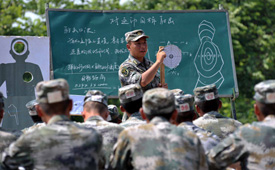|
 |
 |
|
HANDS-ON TRAINING: He Xiangmei, a 31-year-old elite sniper and army officer, lectures his soldiers on sniping skills (REN LONG) |
FIELD TRAINING: Bi Shihua (left), Secretary of the Party Committee of Hongyan Village in Zhenkang County, southwest China's Yunnan Province, trains his fellow villagers on preventing coffee tree pests (LIN YIGUANG) |
A new group of four delegates are college graduates serving as village officials from Jiangxi, Heilongjiang and Jiangsu provinces and Chongqing Municipality respectively.
In recent years, China has selected volunteer college graduates to work as village officials for the country's rural grassroots administrations.
As of the end of 2011, the number of college graduates serving as village officials in China's rural areas topped 210,000, according to the People's Daily.
There is also a substantial increase of delegates from the business community. According to the China Enterprise News, 131 delegates work for Central Government-owned companies, accounting for 5.77 percent of the total number and 26 more than the number at the previous congress.
The representation of the private sector has further grown. Twenty-seven private enterprise owners will attend the 18th CPC National Congress. The number of the delegates from this group to the previous two Party congresses was seven in 2002 and 17 in 2007.
Professor Chen said that the rise in the number of entrepreneur delegates at the national congresses could help consolidate the Party's ruling base, broaden the Party's knowledge of social situations and improve the Party's leadership capacity.
Another group of delegates garnering media attention are scholars. More than 20 academics with the Chinese Academy of Sciences (CAS) and the Chinese Academy of Engineering will attend this year's Party congress as delegates. Most of these scientists and engineers have studied or worked abroad and are leading experts in China in their respective fields, including Bai Chunli, President of the CAS and a leading scientist in nanoscience; Zhan Wenlong, Vice President of the CAS and a nuclear physicist; Zhou Ji, President of the Chinese Academy of Engineering; Li Jiayang, President of the Chinese Academy of Agricultural Sciences; and Zhao Xiangeng, President of the Chinese Academy of Engineering Physics.
When the CPC Central Committee decided in June to give Beijing two more seats at the upcoming Party congress, Hu Angang, a renowned economist and professor at the prestigious Tsinghua University, and Zhang Xueji, a biological sensor expert who had worked in the United States for a decade, were elected as delegates.
Female delegates account for 23 percent of the total and ethnic minorities account for 11 percent.
According to established practices, the CPC Central Committee will also invite some Party members who have retired from their leadership posts as special delegates to the congress, Wang said.
Intra-party democracy
To ensure the election of more outstanding delegates, the CPC has, for the first time, carried out a multi-candidate survey on the preliminary candidates of the delegates to the upcoming Party congress.
The loss margins in electing delegates to the 18th CPC National Congress were required to be 15 percent or above nationwide, according to the Organization Department of the CPC Central Committee. The required loss margin was also above 15 percent for the 17th CPC National Congress and above 10 percent for the 16th CPC National Congress.
| 